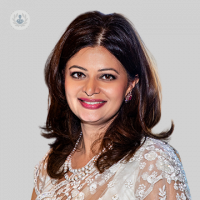What causes men and women to be infertile?
Written by:Infertility is the inability to conceive, it affects both men and women alike. In the UK, 1 in 5 couples have fertility problems.

We spoke to Dr Anu Chawla, a renowned consultant fertility specialist, to discuss the many factors that may cause infertility and the steps of identifying them. We found out what investigations are required, for males and females, before they finally receive a personalised plan of management for infertility.
What can cause female infertility?
- Not having intercourse enough. This may be a dependent factor such as work, or a husband may live far away. This can be a major factor in delaying a pregnancy.
- Infections (local infections in the vagina). This could be something as simple as a yeast infection, bacterial vaginosis or an STD. Also, changes in the PH of the vagina can mean it’s not a good environment for the sperm to survive. All these factors can be a cause of infertility.
- Infection or inflammation of the cervix, this means the cervix won’t allow the sperm to swim freely.
- Infection or inflammation in the uterine cavity, there may be an abnormality in the uterine cavity such as uterine didelphys or subseptate uterine.
- A problem with the fallopian tube such as a blockage.
- Ovulation defect when the woman is not producing eggs.
- The quality of the egg can be the issue. Some treatments and supplements can be used to improve the quality of the egg. To enable the sperm to fertilise it.
- There may be a problem with the lining of the uterus, when it is not well prepared for the fertilised egg therefore it is likely to be a failed pregnancy. This will require further attention and treatments.
What can cause male infertility?
- Volume of sperm
- Number of sperm
- The motility of the sperm.
- Morphology of sperm, the shape of the sperm under the microscope.
- Presence of abnormal cells within the sperm or infected cells with semen sample.
Apart from the list above, the lifestyle of the male also plays a big role. For example, whether he has a regular sexual relationship with his partner, whether he has any infectious STDs is overweight, drinks or smoke. All these factors can contribute to male infertility.
- STDs are one of the main factors of male infertility.
- Being overweight. having a BMI above 30 should be considers overweight. Having a BMI over 35 is obese. Both are major factors in the cause of male infertilely.
- Heavy smokers. Nicotine from smoking are major factors in reducing and damaging sperm.
- Using alcohol or drugs can decrease the likelihood of strong sperm.
- Large varicocele
- Hydrocele
- Undescended testicle of either one or two testicles.
- Testicular atrophy
- Retrograde ejaculation
- Sexual dysfunction
General health problems can also play a role. Diabetes can affect a male’s sexual dysfunctions and can develop abnormal sperm. There are many other health issues that can affect the male fertility.
What factors should couples be aware of when trying to conceive?
- The older women are, the less fertile they become. This is the same with men. The ideal age for a woman to get pregnant is between 22 and 28. The average age of marriage is increasing to the ages of 35-36 years. It is recommended here at Queen’s clinic that if you are between age 30-35 and are not ready to have children, we suggest looking into egg/embryo freezing as a precautionary measure for storing a younger eggs or good embryos.
- Women and men who are overweight are at a higher risk of having difficulties trying to conceive.
- Women and men who often smoke or drink are seen to have difficulties.
What are the stages for investigating infertility prior to treatment at Queens clinic?
- We check the full detailed medical history.
- We carry out a full examination with patients consent.
- An ultrasound of the female’s genital organs, using transvaginal ultrasounds.
- Full blood studies, including hormone at the appropriate time of the cycle. This is usually day 2/3 of the period.
- Operative investigations, such as HyCoSy, hysteroscopy, diagnostic laparoscopy followed by operative laparoscopy for treating any pathology found during laparoscopy, to be able to conceive naturally which is our aim at Queens Clinic if possible. However, if not possible due to the nature of the pathology found, an alternative ART (assisted reproductive treatment) may be necessary such as IVF/ICSI.
- Personalised plan of management.
What methods do you use to treat infertility?
The treatment for the couple is planned very carefully with detailed history examination, and investigations. The treatment is tailored for each case individually, and it may differ in the approach of treatment to achieve the highest success rate from one couple to another. Yet they may be of similarity of the history outset.
It’s fundamental that we check their medical history. We aim to find a solution for couples to conceive a pregnancy naturally, treatment will vary depending on the causes of infertility. IVF is usually the last resort should we have exhausted the possibility of a couple having a natural pregnancy. When we do carry out IVF however, it is very effective.
To get the very best treatment for infertility, we recommend booking an appointment with a leading fertility expert such as Dr Anu Chawla. Visit her Top Doctors profile today to book an appointment with her.


